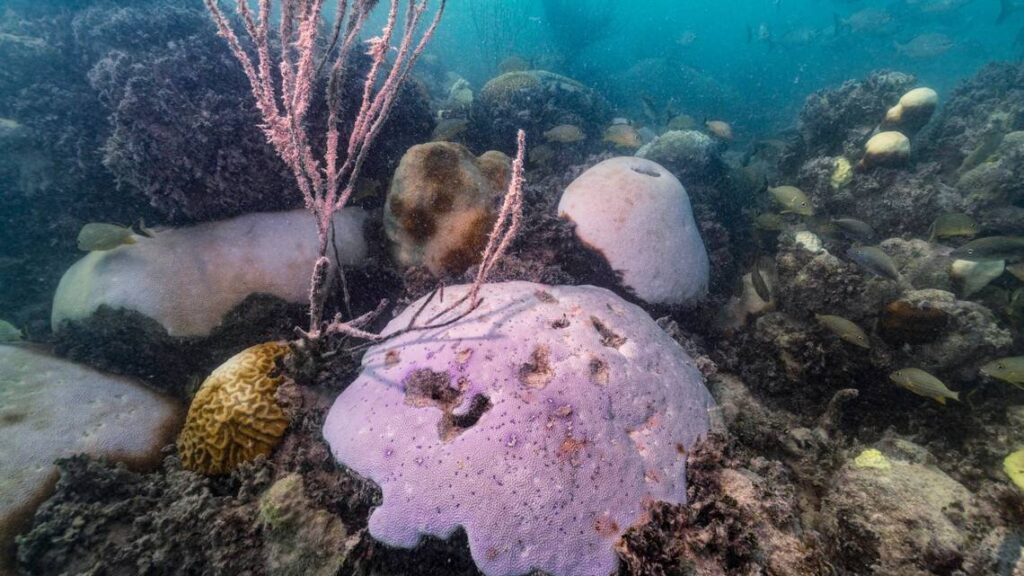MIAMI — The first survey of Florida’s reefs after an ‘apocalyptic’ marine heat wave offers a bleak picture of the future of the state’s renowned corals — and the restoration efforts to save them.
Scientists with NOAA’s Mission: Iconic Reefs program visited five reefs throughout the Florida Keys on Thursday to check on the health of the nursery-raised and transplanted corals researchers installed there over the last few years. They found coral graveyards.
It’s a major setback to one of the most promising solutions to Florida’s declining reefs — replanting infant coral fragments — and could represent a generation lost to last summer’s scorching sea.
At one nursery, at the Looe Key Reef in the lower Keys, researchers didn’t see a single live staghorn or elkhorn coral at any of the sites they surveyed. That’s the same spot where researchers with the Coral Restoration Foundation reported “100% mortality” in July.

A brain coral currently in the process of being bleached attempts to recover after this years bleaching on Thursday, October 5, 2023 at Cheeca Rocks in Islamorada. According to Ian Enochs, NOAA Research Ecologist that has been covering the site for many years, the yellow is healthy coral that may be recovering and the white is dead bleached coral. The coral to the upper right is bleached as well. (MIAMI HERALD photo by Alie Skowronski)
NOAA only checked on transplanted staghorn and elkhorn coral at the five reefs they surveyed, and the outlook wasn’t good. However, the report did note that “anecdotal evidence” suggests that other types of coral, like massive, brain and boulder, might have fared better, including at places like Looe Key.
Scientists only found living elkhorn coral at three sites: Carysfort Reef, Sombrero Reef in the middle Keys and Eastern Dry Rocks off Key West. The only surviving staghorn samples were at the northernmost reefs, Carysfort and Horseshoe Reef.
“Preliminary data indicate that less than 22% of approximately 1,500 staghorn coral (Acropora cervicornis) surveyed remain alive,” the scientists reported.
This snapshot of coral health reveals that some of coral scientists’ worst fears after this summer’s record-breaking heat wave may be true. In 2023, the coastal waters off South Florida heated up earlier than usual, got hotter than they ever have in recorded history, and stayed that way for longer than they have in 30 years.

In those conditions, which topped 90 degrees Fahrenheit at times, the symbiotic algae that live within corals are spit out, leaving the corals bone-white and starving, vulnerable to sunburn and disease.
The threat was so dire, scientists took the unusual step of removing baby corals from their underwater nurseries and storing them on land, or canceling replanting efforts altogether.
Not all corals die after being bleached, but this NOAA report reveals that many did.
But coral reef scientists, like Andrew Baker, a professor of marine biology and ecology at the University of Miami Rosenstiel School of Marine, Atmospheric, and Earth Science, said they prefer to focus on the ones that made it.
“On balance, a fifth of the colonies surviving is somewhat better than we expected,” he said. “While the overall toll might not have been quite as bad as we feared, 80% of the outplanted acroporids is still really bad news and suggests we need to reconsider the strategies for restoration that we are considering.”
Baker, who leads a lab dedicated to keeping Florida’s corals alive as the world warms, said there will be lessons to learn from the corals that didn’t die that could help scientists breed healthier, more resilient corals to replant in the future.
“Knowing that there’s so many colonies that survived, now the next question is why they survived,” he said. “It’s a really interesting scientific question and it’s going to inform restoration efforts.”
By ALEX HARRIS/Miami Herald
If you enjoy reading the Virgin Islands Free Press, please let John know by sending $25.00 via PayPal to: johnfmccarthy807@msn.com



